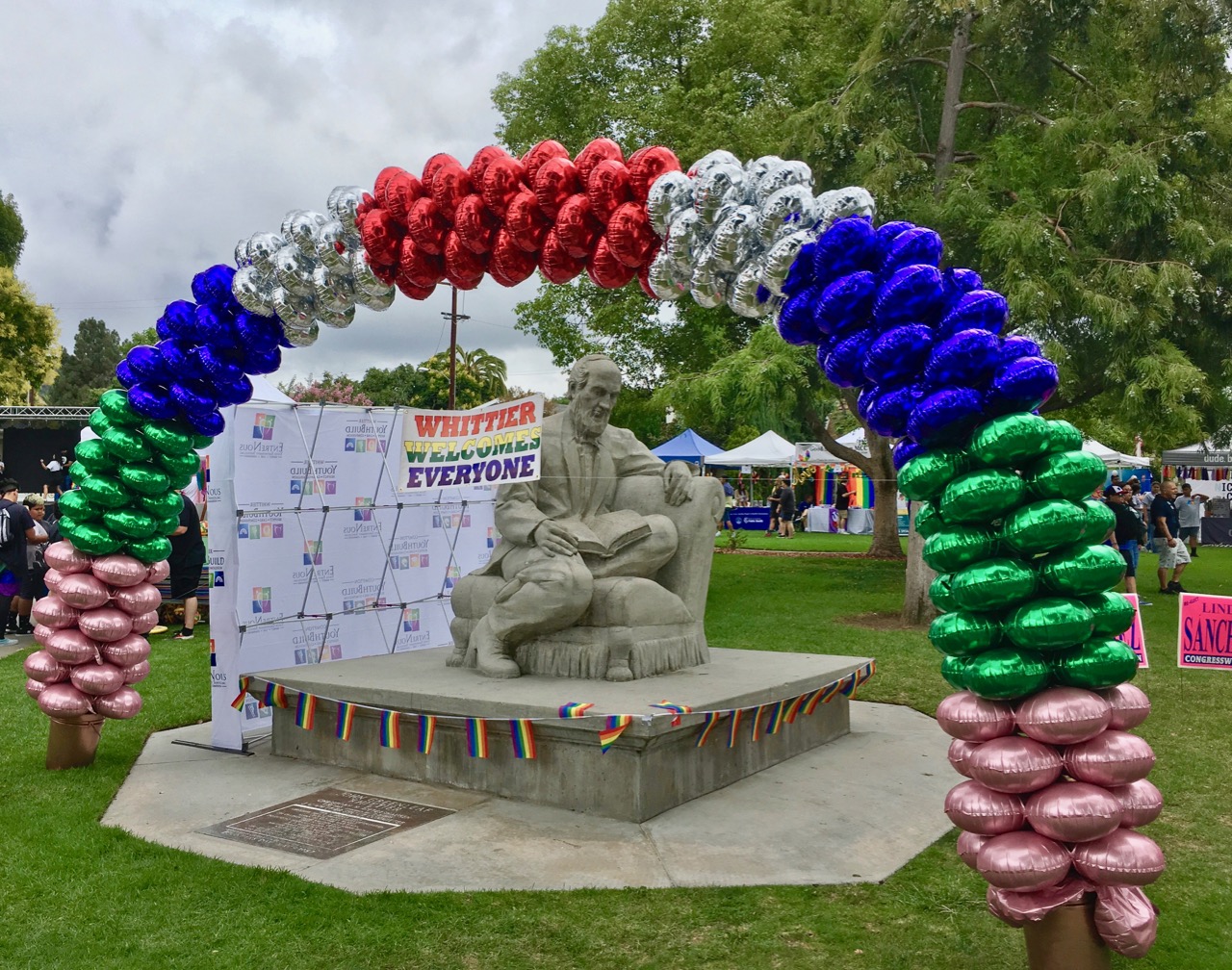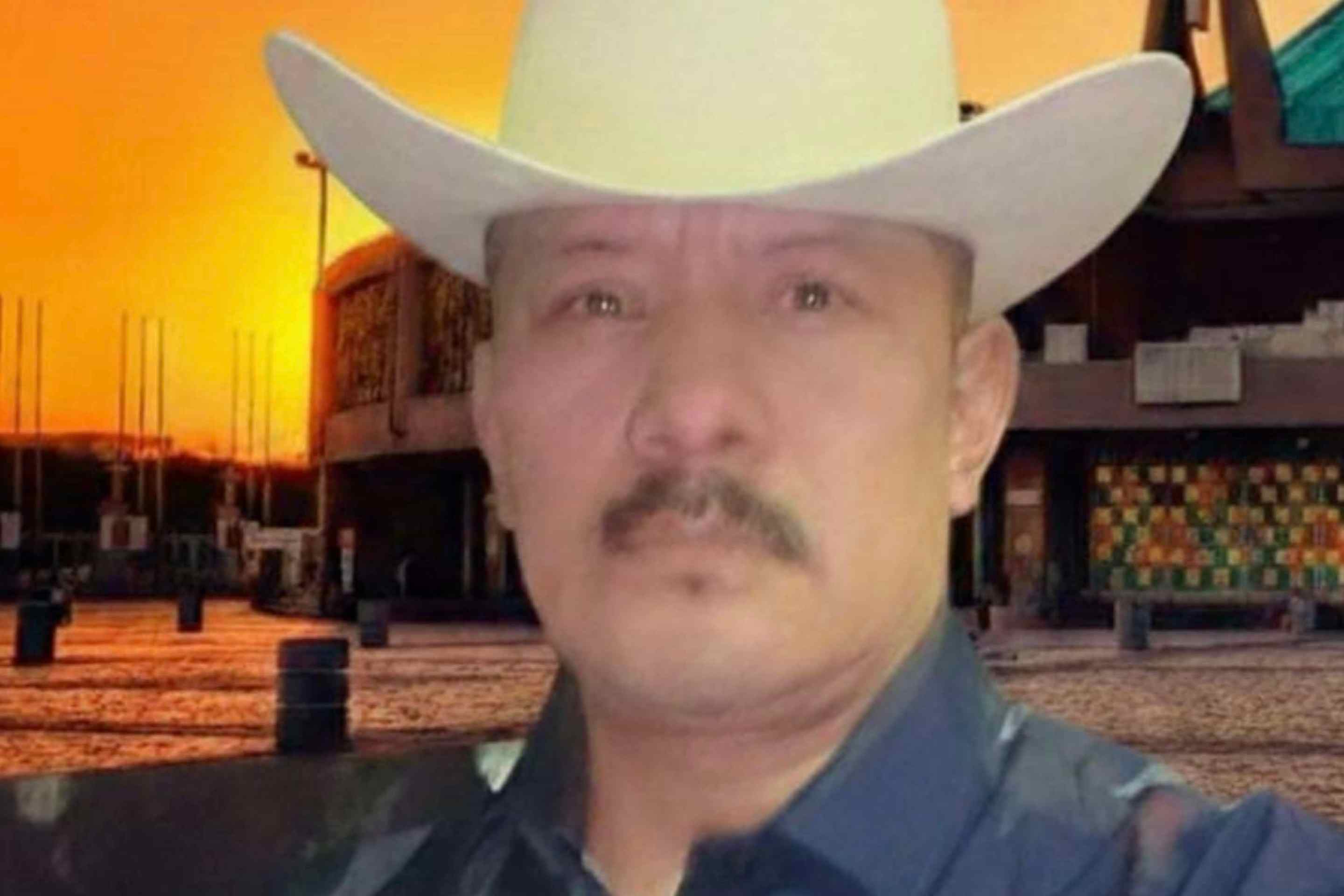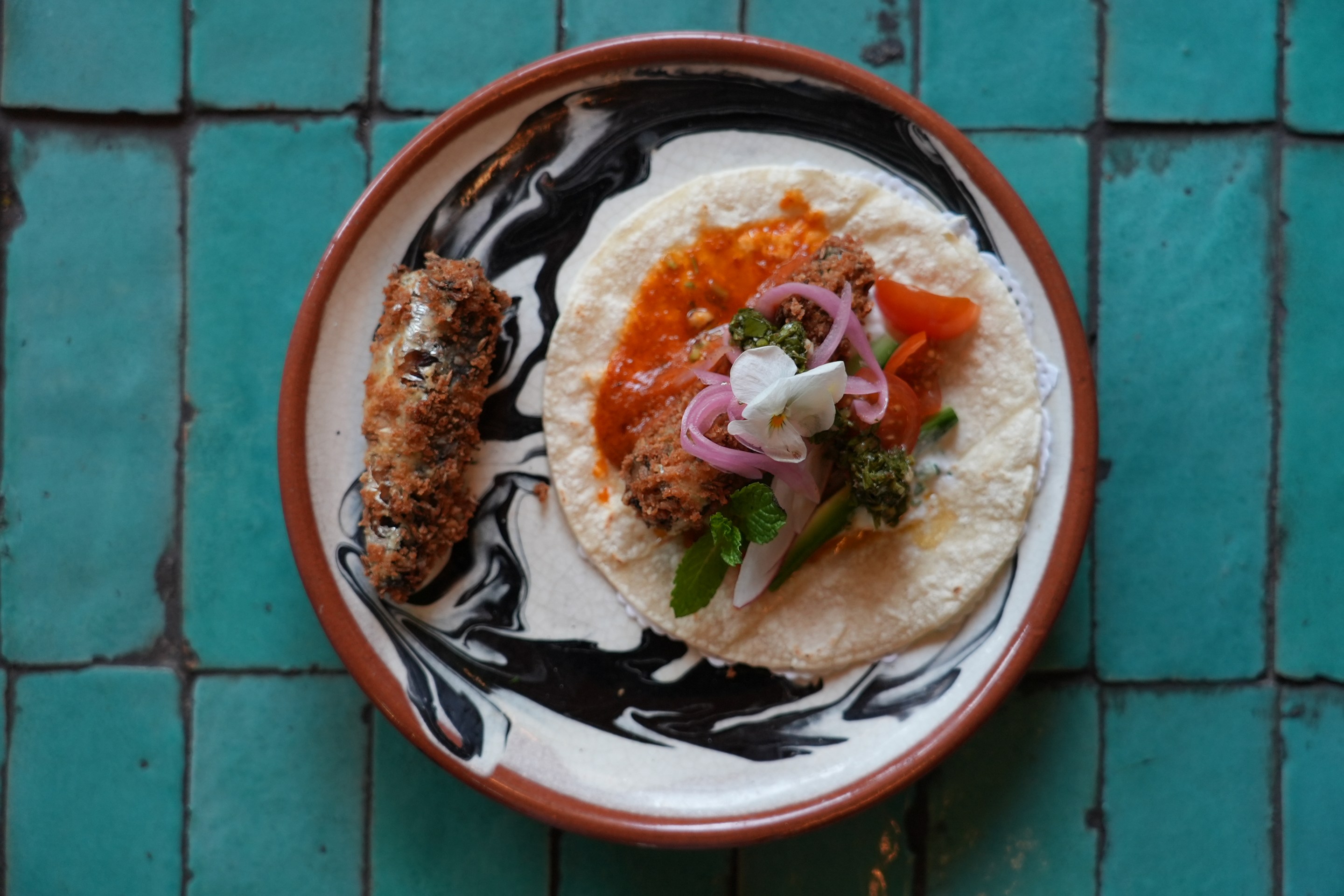[dropcap size=big]G[/dropcap]rey skies, heavy clouds, rain in the forecast, and blustery temperatures in the low 70s—aka, 'cold for L.A.’—threatened to put a damper on Whittier’s LGBTQ Pride festival, the first of its kind held in this quaint, historically conservative town best known for its ties to President Richard “I am not a crook” Nixon.
“We thought maybe a thousand people would show up,” said Sayaka Ponce, executive director of Whittier YouthBuild, the main organizer of the Whittier Pride Festival.
“The City counted closer to 5,000.”
From all over Whittier and the greater Eastside, and as far away as Oxnard and Riverside, LGBTQ folks and their supporters made history when they came to Whittier’s Central Park for the community, family, mariachis, and drag queens.
But mostly, 5,000 people came to Whittier Pride as a powerful statement of their community’s longstanding presence in the region: we are here, we are queer, we are from here, we have been here, and we are not going anywhere.
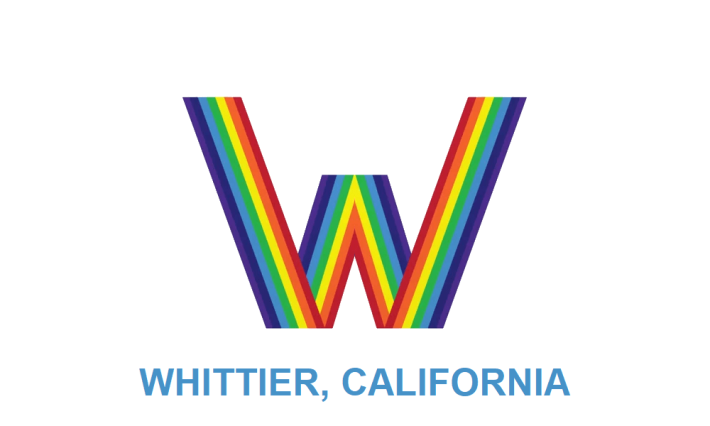
It started with the youth
The idea for Whittier’s Pride festival began with LGBTQ students who attend Whittier YouthBuild, a charter school that serves low-income 16 to 24-year-old students, who left or have been “pushed out” of traditional high schools. Ponce says many of the students at Whittier YouthBuild are LGBTQ from working-class families of color.
What started as a 'small family picnic' turned into a 'pride experience' beyond expectation.
“There’s been such a gap in service for LGBT youth in these communities,” explains Ponce. She recognized this gap she worked at the YouthBuild campus in her hometown of Norwalk for 11 years.
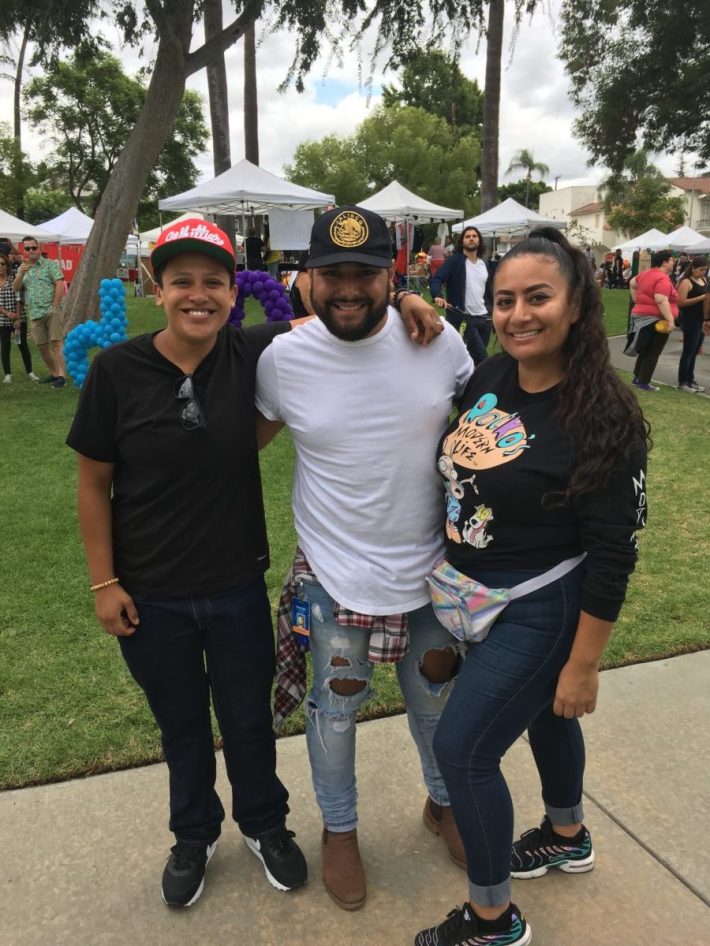
“A lot of the youth who came to Norwalk for services were from the Whittier and the Pico Rivera-605 [freeway] area,” Ponce said. “So when I got to the Whittier campus, we wanted to create an opportunity for young people to organize an event for themselves in their community.”
What started as a “small family picnic” turned into a “pride experience” beyond expectation.
“They wanted entertainment. They wanted an adaptation of all the Prides they had been to, but they wanted it to be youth-oriented and family-friendly, and something that felt like Whittier,” said Ponce.
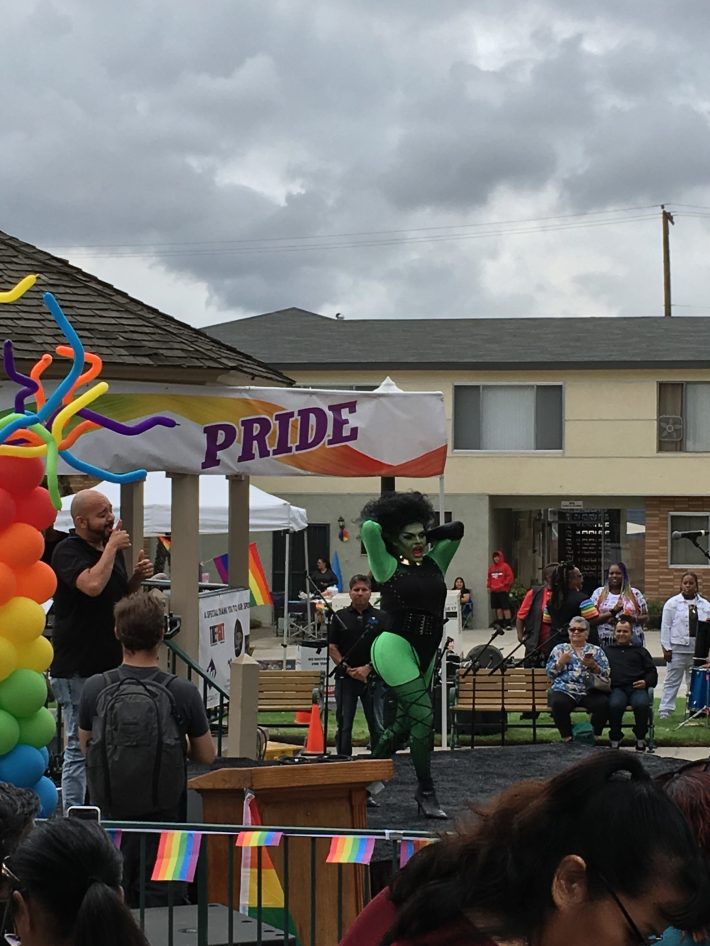
Within months, the organizing committee applied for permits and put together the entertainment lineups. By mid-August 2019, the Whittier City Council unanimously approved Whittier Pride by a vote of 5-0 and waived all fees associated with the permits.
We queer gente have to 'make familia from scratch' to survive in this world.
Local businesses and politicians such as Los Angeles County Supervisor Janice Hahn, California Senator Bob Arcuhleta, U.S. Congresswoman Linda Sánchez, and California Assemblyman Ian Calderon all threw their generous support behind the event.
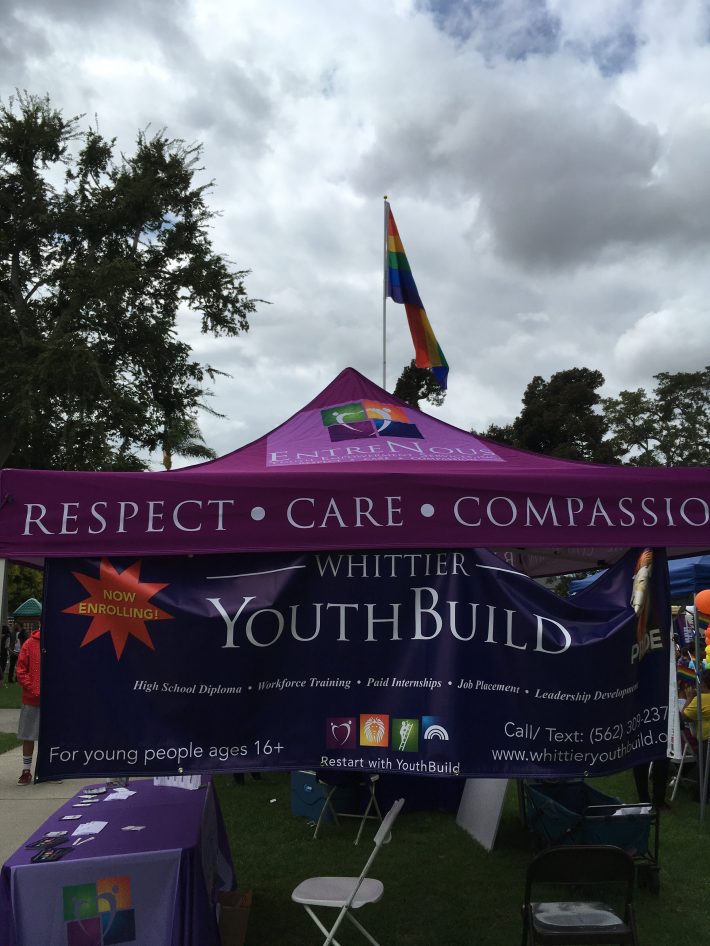
The Pride festival showcased local and national talent across the entertainment spectrum. Venus D-Lite, an Orange County Latinx drag queen who competed on VH-1’s RuPaul’s Drag Race, hosted the event, which featured vendors and information booths from various local LGBTQ and allied organizations. Two entertainment stages gave audiences plenty to watch, sing, and dance to, including bands and DJ sets, Polynesian and swing dancers, marionette puppets, and of course, plenty of drag queens.
'It’s really emotional to see this in such a conservative place'
Sunny and Xochitl moved to Whittier after they got married four years ago. “We grew up in Covina and West Covina, and came here today because we have to represent,” said Sunny, excited to be here with her wife. “We got to come out and support our first Pride. We brought some family and told a bunch of friends.”
Both pointed to the lack of places for local queer folks to hang out or find each other. After all, this isn’t the 1990s, when Q’s billiards hosted a ‘gay night’ in Uptown, or when local lesbians could go to a bar like the Sugar Shack over the hill in El Monte.
'When the city first announced that Pride would be held at the park, we started getting calls from people complaining about it. They asked why we were letting them have gay pride in the park,' Mendoza told L.A. Taco. 'I’m from Whittier, too. I graduated from right here, down the street. It’s our park, too.'
“You look for events sometimes going on in the city,” said Sunny, “and you realize that the closest gay bar or club is in Bellflower. So it’s nice to see the community come out. You don’t feel so alone. We want to keep it going and hope that it continues to grow every year.”
Xochitl chimed in. “It’s very cool to see this,” she said. “We both got a little emotional just to see [Pride] and the progress in the area.”
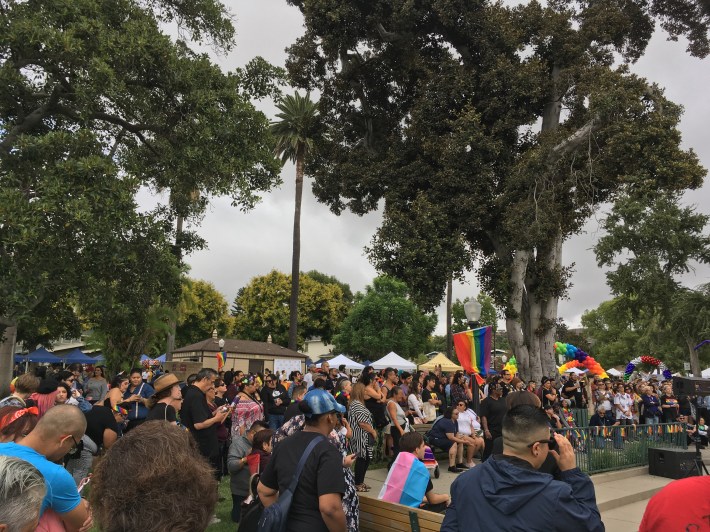
Other people I spoke to overwhelmingly echoed this sentiment.
Jay Proano works at a local middle school and has lived in Whittier for twenty-seven years.
“I heard friends and neighbors talking about Pride,” Proano told L.A. Taco. “We were skeptical at first because it’s still Whittier. Growing up in this town, I never expected there to be an event like this. The fact that there’s that many people there, in support of it, I’m shocked. It’s always been a conservative town.”
Even more recent high school grads have expressed their reservations about being ‘out’ in Whittier. “The city can be very conservative sometimes, especially around ‘beautiful historic Uptown’ and the [Friendly] Hills” says Maireya Espinoza.
'Being a gay person in Whittier was just taboo.'
Espinoza came to Pride with some friends, all Whittier High alumni from ten years ago. They shared memories of queer friends having to be “in hiding” about their identities.
“Being a gay person in Whittier was just taboo,” said her friend, Michael. “We didn’t really see the city acknowledge any of this, so it’s refreshing to have something like this and also be family-oriented.”
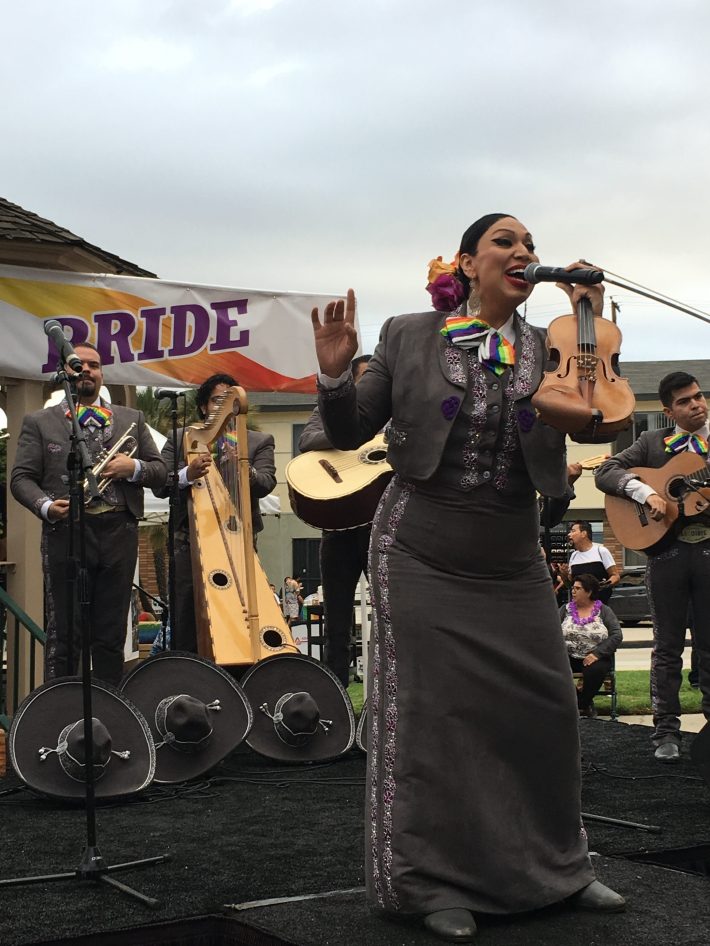
As Ponce points out, local gays and lesbians with kids also wanted somewhere to bring their children. And many in this community are in recovery and don’t drink. “It’s exciting to see so many young people out there,” said Ponce. “We also had people with kids come from West Hollywood and Oxnard because they wanted to participate in a family-friendly event.”
Some of us were lucky enough to find out about the gay tíos and trans* cousins in our line who were loved unconditionally by mamas, tías, and abuelas.
“Family/familia” as a cultural value holds firm for so many LGBTQ people of color, even when the very families that raise us are often the first source of pain and rejection for queer kids. Some of us were lucky enough to find out about the gay tíos and trans* cousins in our line who were loved unconditionally by mamas, tías, and abuelas.
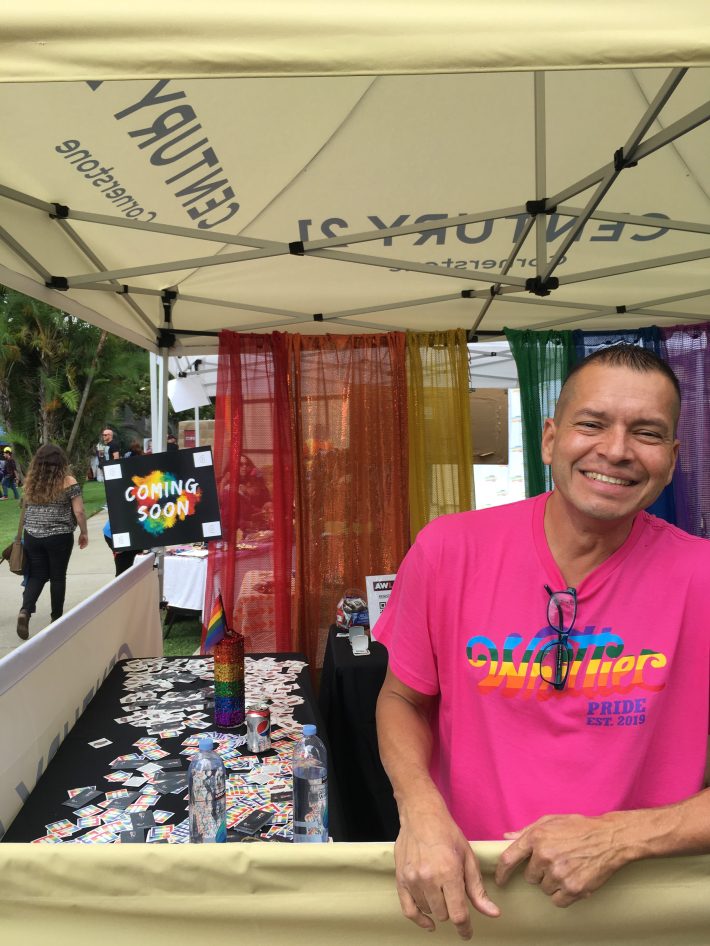
Even so, we queer gente have to “make familia from scratch” to survive in this world, as the Whittier-born, San Gabriel-raised Cherríe Moraga tells us. Events such as Whittier Pride can be “family-friendly” and represent “familia from scratch” without being normative or reproducing the very oppressive structures and ideologies that undergird conservatives’ notion of traditional “family values.”
Until they say ‘No’
For all the support and goodwill around Whittier Pride, critics were worried that it would be like “other gay pride festivals,” where alcohol-soaked revelers would walk around pretty Uptown half-naked or bound to each other in leather.
On social media and at the city council meetings, concerned citizens and a couple of city officials expressed these and other reservations based on such ideas of LGBTQ people.
Jeidi Nava Mendoza is a Whittier High alum who works for the city’s parks and recreation department. She described another level of anti-Pride sentiment when she told me about the phone calls she and her coworkers received.
If the attendance at Whittier Pride tells us anything, there are plenty of young brown queers here to signal a next-generational shift of Whittier’s political makeup.
“When the city first announced that Pride would be held at the park, we started getting calls from people complaining about it. They asked why we were letting them have gay pride in the park,” Mendoza told L.A. Taco. “I’m from Whittier, too. I graduated from right here, down the street. It’s our park, too. But there are still a lot of conservative people here who don’t want to see us have a Pride fest.”
If the attendance at Whittier Pride tells us anything, there are plenty of young brown queers here to signal a next-generational shift of Whittier’s political makeup.
'This was pretty much the SGV and greater Eastside Latinx pride.'
As one observer noted about Whittier’s LGBTQ festival, “This was pretty much the SGV and greater Eastside Latinx pride.” Next week, Pasadena will host the first San Gabriel Valley LGBTQ+ Pride, while the Southeast L.A. city of South Gate will host their first one in April 2020.
When I looked around the event and saw all the young people—from pre-teen to early twenties—claiming their space in this town, walking in their beautiful skins, self-possessed and unapologetic in their budding queerness, I felt nothing but pride.
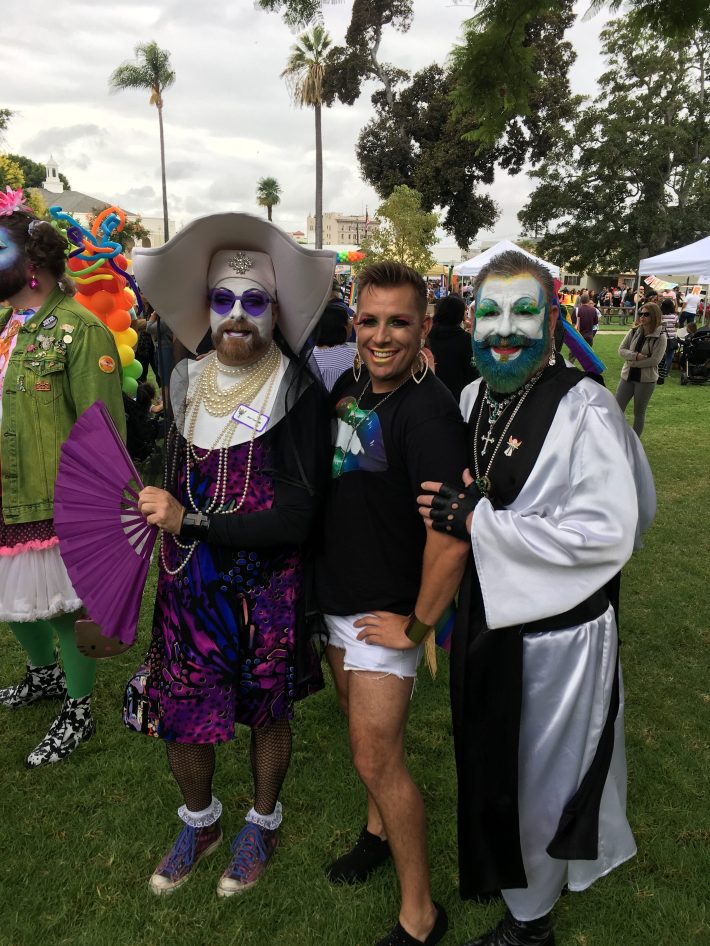
When I was their age in the 1980s and 1990s, there was no way I knew how to name my queerness, let alone how to walk in it this fiercely, at that age. I had to leave, go to college away in Berkeley first and then graduate school all the way in Bloomington, Indiana, of all places, before I finally came out as a dyke in my early twenties.
My own hometown of Whittier, close to “L.A.” and all the gays in Hollywood as my Midwestern friends imagined, couldn’t boast half the things I found in Bloomington, from the town’s three queer bars—“one for the gays and old queens, one for the dykes, and one for the college kids who wanna dance,” as a working-class butch classmate from Chicago explained to me one night—to The Bloomington Beacon, Indiana’s only LGBT newspaper with a circulation that reached Louisville across the Kentucky state line.
Whittier was not always “Ye Friendly Towne” for me. I could not come out in Whittier 30 years ago.
Whittier was not always “Ye Friendly Towne” for me. I could not come out in Whittier 30 years ago, certainly not at La Habra High School, nor could I have even imagined that I’d see a “gay pride” in stuffy old Uptown, where my mom worked with middle-aged library ladies from places like Missouri and Oklahoma.
Only now as a grown Chicana butch in my mid-forties can I walk into my hometown and dance to Selena and Depeche Mode at the “gay brunch” in a steakhouse named after Nixon. Or sing “Baba O’Reilly” at karaoke until I spin myself silly to the floor. Or walk around holding hands with my fem, defying occasional sneers and jeers from passersby.
Because when I see the queer brown kid in a Smiths tee shirt holding hands furtively with his shy denim-clad boyfriend, or the cute butcha just out of high school strutting for her fem friend, I know we’re here, we’ve been here, and we always have been. It’s just our time now.
Sayaka Ponce said it best. “There will be Whittier Pride next year in 2020. We will do Pride every year from now on in Whittier until they tell us we can’t anymore.”
--
The author wishes to thank Stacy Macías, Monica Hidalgo, Brandon Mitsunaga, Herman Salazar, and Lucy Zuzuárregui for their valuable input and support in writing this article.
